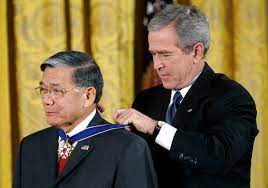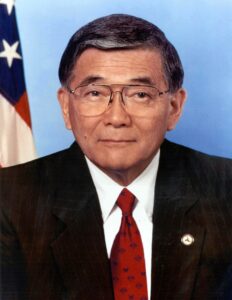Although he made his home on the East Coast, Mineta’s heart was always in the Bay Area.
![]()

Editorial is the opinion of Morgan Hill Life
Norman Mineta’s legacy in America will be long remembered as one of honor and duty in breaking the racial barriers for Asian Americans. He served in government posts from the San Jose City Council to the White House. Throughout his life and years of public service, he gave his fellow citizens an example of a leader committed to the cause of democracy.
 Mineta died at age 90 May 3 in his Edgewater, Maryland home. He was a child of Japanese immigrants. Born Nov. 12, 1931 in San Jose, he grew up active in school, playing baseball and involved in the Boys Scouts.
Mineta died at age 90 May 3 in his Edgewater, Maryland home. He was a child of Japanese immigrants. Born Nov. 12, 1931 in San Jose, he grew up active in school, playing baseball and involved in the Boys Scouts.
After the Japanese military’s attack on Pearl Harbor in 1941, he found himself one of about 10,000 people of Japanese ancestry sent with his family to the Heart Mountain World War II internment camp in Cody, Wyoming. Arriving at the camp, Mineta was saddened to have his beloved baseball bat confiscated by federal agents because they thought it could be used as a weapon.
After graduating from college and serving a few years in the U.S. Army, he worked at his father’s insurance business in San Jose. He was appointed to fill a vacant seat in the city’s city council in 1967. He made history in 1971 when he became the first Japanese-American mayor of a major U.S. city in 1971. The night after Mineta was elected, a bigoted individual spray-painted the letters “JAP” on his home’s garage door.
From local government, his political career was on a rocket ride. Voters elected Mineta to Congress in 1975. He received from a man a $1,500 bat once owned by Hank Aaron to replace the one he was forced to give up at Heart Mountain. Again, Mineta found himself returning the bat as it violated the congressional ban on gifts valued at more than $250. Mineta joked: “The damn government’s taken my bat again.”
Mineta served 11 terms, representing the southern region of San Jose and the community of Morgan Hill. In 2000, President Bill Clinton appointed him to serve as his Secretary of Commerce, making Mineta the first Asian American to hold an office on a presidential cabinet.
 When President George W. Bush came into office, he appointed Mineta as his Secretary of Transportation, becoming the first cabinet member to switch from a Democratic to a Republican administration. After the Sept. 11 terrorist attacks, Mineta organized the creation of the Transportation Security Administration for the government to take over security at airports. After his retirement, the San Jose International Airport was renamed Norman Mineta San Jose International Airport in his honor.
When President George W. Bush came into office, he appointed Mineta as his Secretary of Transportation, becoming the first cabinet member to switch from a Democratic to a Republican administration. After the Sept. 11 terrorist attacks, Mineta organized the creation of the Transportation Security Administration for the government to take over security at airports. After his retirement, the San Jose International Airport was renamed Norman Mineta San Jose International Airport in his honor.
After he left the Bush administration in 2006, he was awarded the Presidential Medal of Freedom. He spent his post-government years working for Hill & Knowlton, a public relations company, and later became vice chairman of L&L Energy.
Although he made his home on the East Coast, Mineta’s heart was always in the Bay Area. He came back to Santa Clara County often, and several years ago enjoyed a meal in downtown Morgan Hill at Ladera Grill. He dined with his wife, Deni, and his former chief of staff and his wife, John and Michelle Flaherty, residents of Gilroy. Visiting his hometown in 2007, a reporter asked Mineta which of his many titles he preferred. “Primarily, it’s Mr. Mayor,” he replied, “because I really love San Jose.”
 About 15 years ago, Morgan Hill Life publisher Marty Cheek spent an hour interviewing Mineta, then Secretary of Transportation, for a magazine story. “We had a great time chatting about his life,” Cheek recalled. “He was a jovial man, a gentleman. He was very humble, telling me he had been lucky that so many doors of opportunity opened for him. And he was dedicated to the American experiment, giving so much of himself to a federal government that had failed him when he was a 10 year old placed behind barbed wire in Wyoming.”
About 15 years ago, Morgan Hill Life publisher Marty Cheek spent an hour interviewing Mineta, then Secretary of Transportation, for a magazine story. “We had a great time chatting about his life,” Cheek recalled. “He was a jovial man, a gentleman. He was very humble, telling me he had been lucky that so many doors of opportunity opened for him. And he was dedicated to the American experiment, giving so much of himself to a federal government that had failed him when he was a 10 year old placed behind barbed wire in Wyoming.”
Norman Mineta’s story is uniquely American. From a humble home in San Jose where he grew up with a love of baseball and the Boy Scouts to his rise to political leadership, he will be remembered as one of the most influential Asian Americans in U.S. history.
Celebrated as a bipartisan visionary who preached political civility during decades of public service, his life provides our current leaders with a vital lesson. Despite the shame he experienced as a Japanese American imprisoned in a government internment camp, his dedication to democracy made him a bold change-maker with a deft political touch whose legacy includes a lifelong commitment to social justice.






